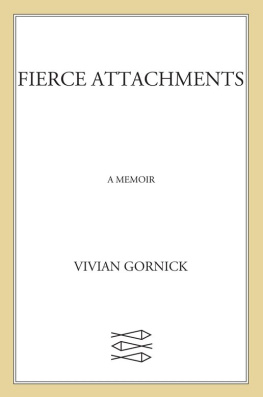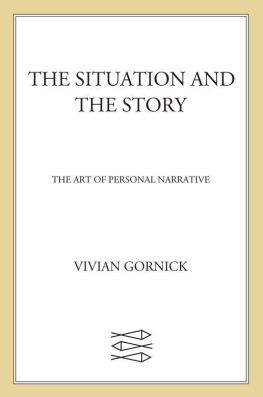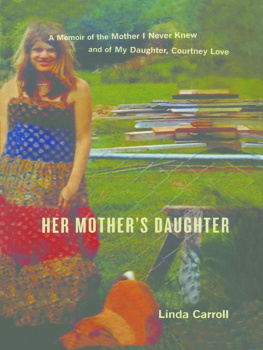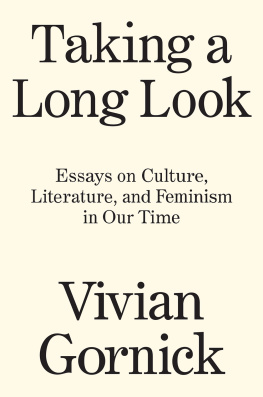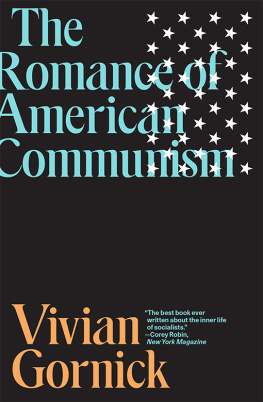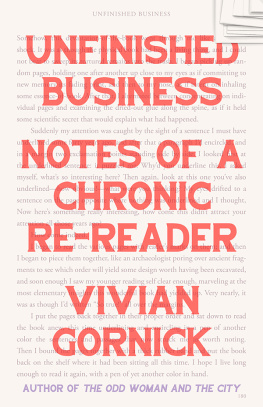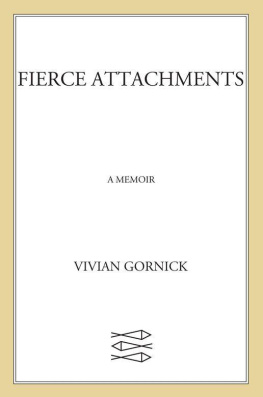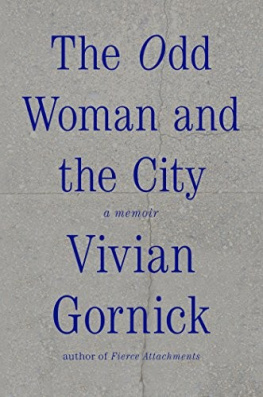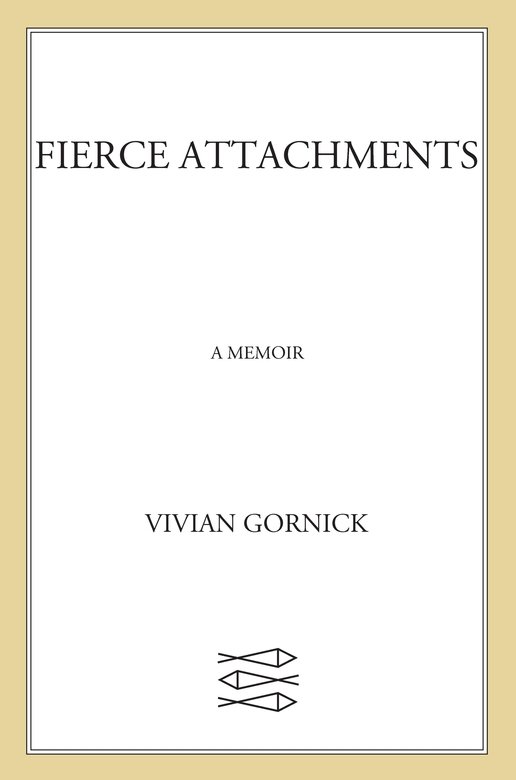Im eight years old. My mother and I come out of our apartment onto the second-floor landing. Mrs. Drucker is standing in the open doorway of the apartment next door, smoking a cigarette. My mother locks the door and says to her, What are you doing here? Mrs. Drucker jerks her head backward toward her own apartment. He wants to lay me. I told him hes gotta take a shower before he can touch me. I know that he is her husband. He is always the husband. Why? Hes so dirty? my mother says. He feels dirty to me , Mrs. Drucker says. Drucker, youre a whore, my mother says. Mrs. Drucker shrugs her shoulder. I cant ride the subway, she says. In the Bronx ride the subway was a euphemism for going to work.
I lived in that tenement between the ages of six and twenty-one. There were twenty apartments, four to a floor, and all I remember is a building full of women. I hardly remember the men at all. They were everywhere, of coursehusbands, fathers, brothersbut I remember only the women. And I remember them all crude like Mrs. Drucker or fierce like my mother. They never spoke as though they knew who they were, understood the bargain they had struckwith life, but they often acted as though they knew. Shrewd, volatile, unlettered, they performed on a Dreiserian scale. There would be years of apparent calm, then suddenly an outbreak of panic and wildness: two or three lives scarred (perhaps ruined), and the turmoil would subside. Once again: sullen quiet, erotic torpor, the ordinariness of daily denial. And Ithe girl growing in their midst, being made in their imageI absorbed them as I would chloroform on a cloth laid against my face. It has taken me thirty years to understand how much of them I understood.
My mother and I are out walking. I ask if she remembers the women in that building in the Bronx. Of course, she replies. I tell her Ive always thought sexual rage was what made them so crazy. Absolutely, she says without breaking her stride. Remember Drucker? She used to say if she didnt smoke a cigarette while she was having intercourse with her husband shed throw herself out the window. And Zimmerman, on the other side of us? They married her off to him when she was sixteen, she hated his guts, she used to say if hed get killed on the job (he was a construction worker) it would be a mitzvah . My mother stops walking. Her voice drops in awe of her own memory. He actually used to take her by physical force, she says. Would pick her up in the middle of the living-room floor and carry her off to the bed. She stares into the middle distance for a moment. Then she says to me,The European men. They were animals. Just plain animals. She starts walking again. Once, Zimmerman locked him out of the house. He rang our bell. He could hardly look at me. He asked if he could use our fire-escape window. I didnt speak one word to him. He walked through the house and climbed out the window. My mother laughs. That fire-escape window, it did some business! Remember Cessa upstairs? Oh no, you couldnt remember her, she only lived there one year after we moved into the house, then the Russians were in that apartment. Cessa and I were very friendly. Its so strange, when I come to think of it. We hardly knew each other, any of us, sometimes we didnt talk to each other at all. But we lived on top of one another, we were in and out of each others house. Everybody knew everything in no time at all. A few months in the building and the women were, well, intimate.
This Cessa. She was a beautiful young woman, married only a few years. She didnt love her husband. She didnt hate him, either. He was a nice man, actually. What can I tell you, she didnt love him, she used to go out every day, I think she had a lover somewhere. Anyway, she had long black hair down to her ass. One day she cut it off. She wanted to be modern. Her husband didnt say anything to her, but her father came into the house, took one look at her cut hair, and gave her a slap across the face she saw her grandmother from the next world. Then he instructed her husband to lock her in the house for a month. She used to come down the fire escape into my window and out my door. Every afternoon for a month. One day she comes back and were having coffee in the kitchen. I say to her, Cessa, tell your father this is America,Cessa, America. Youre a free woman. She looks at me and she says to me, What do you mean, tell my father this is America? He was born in Brooklyn.
My relationship with my mother is not good, and as our lives accumulate it often seems to worsen. We are locked into a narrow channel of acquaintance, intense and binding. For years at a time there is an exhaustion, a kind of softening, between us. Then the rage comes up again, hot and clear, erotic in its power to compel attention. These days it is bad between us. My mothers way of dealing with the bad times is to accuse me loudly and publicly of the truth. Whenever she sees me she says, You hate me. I know you hate me. Ill be visiting her and shell say to anyone who happens to be in the rooma neighbor, a friend, my brother, one of my niecesShe hates me. What she has against me I dont know, but she hates me. She is equally capable of stopping a stranger on the street when were out walking and saying, This is my daughter. She hates me. Then shell turn to me and plead, What did I do to you, you should hate me so? I never answer. I know shes burning and Im glad to let her burn. Why not? Im burning, too.
But we walk the streets of New York together endlessly. We both live in lower Manhattan now, our apartments a mile apart, and we visit best by walking. My mother is an urban peasant and I am my mothers daughter. The city isour natural element. We each have daily adventures with bus drivers, bag ladies, ticket takers, and street crazies. Walking brings out the best in us. I am forty-five now and my mother is seventy-seven. Her body is strong and healthy. She traverses the island easily with me. We dont love each other on these walks, often we are raging at each other, but we walk anyway.
Our best times together are when we speak of the past. Ill say to her, Ma, remember Mrs. Kornfeld? Tell me that story again, and shell delight in telling me the story again. (It is only the present she hates; as soon as the present becomes the past, she immediately begins loving it.) Each time she tells the story it is both the same and different because each time Im older, and it occurs to me to ask a question I didnt ask the last time around.
The first time my mother told me that her uncle Sol had tried to sleep with her I was twenty-two and I listened silently: rapt and terrified. The background I knew by heart. She was the youngest of eighteen children, eight of whom survived into adult life. (Imagine. My grandmother was pregnant for twenty years.) When the family came to New York from Russia, Sol, my grandmothers youngest brother and the same age as her own oldest child (her mother had also been pregnant for twenty years), came along with them. My mothers two oldest brothers had preceded the family by some years, had gone to work in the rag trade, and had rented a cold-water flat on the Lower East Side for all eleven of them: bathroom in the hall, coal stove in the kitchen, a train of dark cubbyhole inner rooms. My mother, then a ten-year-old child, slept on two chairs in the kitchen, because my grandmother took in a boarder.

